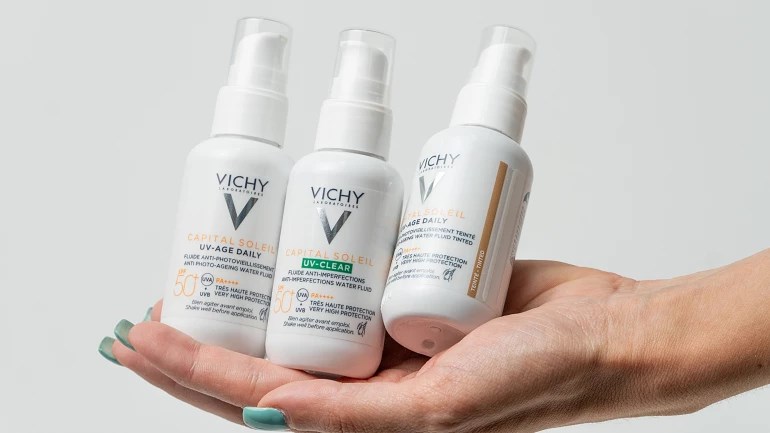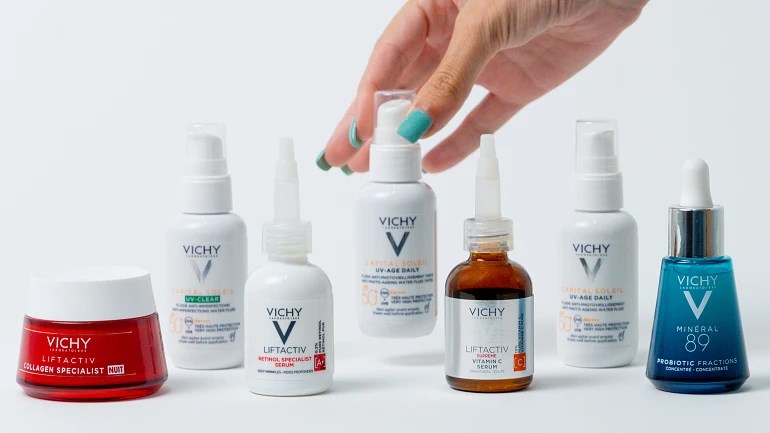As time progresses, it is inevitable that we will notice the gradual changes that occur in our skin. From the age of 30, skin cell renewal begins to slow down, the production of collagen and hyaluronic acid reduces and damage caused by external agents and unhealthy habits accumulates. These factors cause the skin to gradually become drier, thinner and more fragile, with the first wrinkles, fine lines and dark spots appearing... We know we can't stop the clock, but we can slow it back.
The range of anti-ageing cosmetics available is huge, each with its own specific properties. And when we say many, we mean many. Social media is full of ads promoting various options, and a quick walk down the beauty aisle can turn into a real marathon of choices! But don't worry, SweetCare simplifies your search for the perfect routine.
And when is the right time to add an anti-aging cream or serum to your skincare routine? Is starting in your 20s or 30s too soon? Is starting in your 40s or 50s too late? Are there common fundamentals in any routine?
To better understand how to prevent and deal with the first signs of aging, we rely on the experience and knowledge of Marta Ferreira, pharmacist and researcher in the field of Cosmetology, with a Master's Degree in Pharmaceutical Technology and a PhD student in the same area. Learn about the key ingredients, the most common mistakes and the secrets behind anti-aging care, in an approach based on scientific and technical knowledge.
What are the main factors that contribute to skin aging?
The sun is, without a doubt, the main cause of the signs of visible aging, both through ultraviolet B radiation, which burns and damages the surface of the skin, and ultraviolet A, which penetrates deeper and damages collagen, elastin and hyaluronic acid fibers . More recently, it has been discovered that blue light, close to ultraviolet A radiation, also contributes to these effects and, in particular, to the development of spots. At the same time, air pollution, caused by emissions of particulate matter and gaseous pollutants, appears to have a significant effect on worsening the signs of ageing. The role of food, stress, sleep and the products we use on a daily basis are less clear, but it is likely that less healthy habits also have an impact on the skin.
What are the steps to start an anti-aging routine?
Currently, it is agreed that the main step of an anti-aging routine is the daily use of sun protection with a high filtration capacity of ultraviolet B radiation, which burns and generates free radicals, but also ultraviolet A. Short, accumulated exposure to these rays appears to be enough to have an impact on the development of signs of aging. On the other hand, morning and evening cleansing are important to eliminate pollutants and other residues deposited on the skin, while at the same time, through massage, they facilitate the natural renewal of the epidermis. Finally, the use of serums and/or moisturisers containing active ingredients with antioxidant and stimulating action increases the protection of the skin, delaying the appearance of the signs of ageing, and attenuates its appearance, giving the skin a more homogeneous and luminous texture and tone.

What are the key ingredients we should look for in anti-aging products?
According to scientific evidence, the most interesting ingredients are vitamin A (retinol), vitamin C (ascorbic acid) associated with vitamin E (tocopherol), and vitamin B3 (niacinamide). These active ingredients have both a preventive and a role in reducing the signs of ageing. On the other hand, exfoliating acids, namely glycolic, lactic and salicylic acids, accelerate epidermal renewal, which on the one hand improves the appearance on the skin, and also contributes to an increased penetration of the other ingredients in the routine. Ingredients such as hyalur acid Glycerin and glycerin help in this process, giving the skin more hydration and , consequently, a fuller appearance.
How to identify the best approach to skin care, considering skin type and specific aging concerns?
From the age of 20-25, and if there are no specific concerns, it is beneficial to start using an antioxidant serum, which often contains vitamin C, vitamin E, vitamin B3, ferulic acid, and botanical extracts. When the first wrinkles begin to appear, Vitamin A is the ingredient of choice to attenuate them, and can be accompanied by vitamin B3, exfoliating acids and vitamin E. For the prevention and reduction of small spots or irregularities in skin tone, it is common to associate various ingredients such as exfoliating acids, derivatives of resorcinol, azelaic acid, vitamin B3 and tranexamic acid. When the skin becomes very dry, especially during and after menopause, it is essential to use rich moisturizers, capable of retaining water in the skin for several hours and providing comfort.
How important is a consistent skincare routine to achieve long-lasting results?
The results appear slowly, and to be noticeable it is necessary to have a consistent routine that allows to protect the skin from the aggressions of sun exposure and daily environment, while providing a stimulation of cell renewal and activity of skin cells.
In addition to topical products, are there any other steps we can take to slow down skin aging?
Clear. It is important to wear a hat and sunglasses while exposed to the sun, and to have good habits: a balanced diet, rich in fruits and vegetables, and quality sleep.
What are the most common mistakes people make when trying to treat the early signs of aging?
I feel that there is a great tendency to choose a cream or a serum and neglect hygiene and sun protection, which are, in fact, the most impactful steps in the routine.
In addition to a team of pharmaceutical experts who recommend the most suitable routine for you and the publication of numerous editorial articles signed by specialists, recently, the Portuguese brand has developed a Beauty Glossary, where you can find explanations and definitions of terms, ingredients and concepts related to the beauty and skincare industry, and better understand the different terminologies used in cosmetics for a more informed choice and purchase decision. We asked SweetCare to share a proposal for the first anti-aging routine of the Vichy brand to prevent and reduce the first signs of aging, with proven results.

In the morning, after your cleansing routine, we suggest the Liftactiv Supreme Vitamin C serum, with 15% pure vitamin C , vitamin E and pine polyphenols, for an antioxidant, brightening and preventive action against the appearance of blemishes.
Next, it is essential to use a sunscreen with high protection against ultraviolet A and B radiation, which is why we recommend Capital Soleil UV-Age Daily, with a non-greasy finish, which is also available in color and in a formulation for oily skin.
In the evening, if you don't have sensitive skin, you can apply the Liftactiv Retinol Specialist serum , starting by using it 1 to 2 times a week for 2 weeks. If your skin remains comfortable, you can increase the frequency of application gradually, until you can use it every day in your routine.
If your skin is sensitive, or on nights when you do not use Liftactiv Retinol Specialist , we recommend that you replace the previous serums with Minéral 89 Probiotic Fractions, which through vitamin B3, Vichy thermal water and probiotic fractions will allow you to improve skin tolerance. If after applying the serum you feel that the skin needs additional hydration, we suggest the Liftactiv Collagen Specialist Night, with peptides and glycolysated vitamin C .